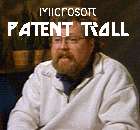

Intellectual Ventures claims not to sue companies, but reports suggest that it is surrounded by 1,000+ 'sibling' companies which sometimes do the lawsuits without bringing Intellectual Ventures into the courtroom. Intellectual Ventures is essentially like the Mafia Don, extorting companies and 'punishing'/retaliating against (suing) them via third parties if they do not comply. MPEG-LA has a similar mechanism going on.
That's the proposition Webvention LLC—which acquired U.S. Patent No. 5,251,294 from patent-hoarding giant Intellectual Ventures last year—has been making to scores of companies in a bid to license its little piece of IV, according to a pair of declaratory judgment lawsuits filed recently in federal district court in Delaware.
[...]
What makes the suits by Tenneco and Novartis particularly intriguing is that they offer the opportunity to read Webvention's demand letters, which are attached as exhibits in both instances.
[...]
It's unclear whether any of the licensing revenue Webvention is generating will go to Intellectual Ventures. The Seattle-area company began selling off some of its tens of thousands of patents last year, and under the terms of some of those deals gets a cut of whatever revenue the patents bring in. The measures that Webvention's owners have taken to shield their identities—setting up shell companies in both Delaware and East Texas—suggest that IV may well have a piece of the action. It's also worth noting that some of the companies that Webvention claims have taken licenses—including Google and Nokia—are known to have licensing deals with or be "investors" in Intellectual Ventures, meaning they may have licenses to many patents that held by IV now or in the past.
Earlier this week, I wrote about the dramatic increase in the number of patents being granted in calendar year 2010 as compared with prior years. [Link] Several outlets expanded upon my report and condemned the USPTO based on a conclusion that the higher issuance numbers must have resulted from reduced examination standards.
Bilski and the US Software Patent Threat: The ball is back in the court of the US Congress: http://t.co/dEc4tmn @jordanhatcher
Europe fought to include patents in ACTA. Now patent damages must consider suggested retail price of infringed patented good.
But pharma patents and copyrights, unlike software patents and copyrights, carry risks which the Meredia case illustrates. Drugs can be found to be dangerous years after their introduction, creating unexpected liabilities.